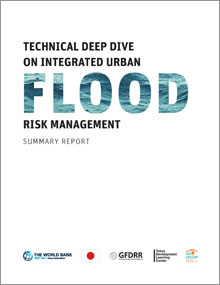Floods pose serious risks to cities around the world—and challenges to officials who aim to reduce those risks. Urban flooding is becoming increasingly costly and difficult to manage, as low- and middle-income countries transition to largely urban societies. Japan’s integrated urban flood risk management give important lessons to countries taking on these challenges, particularly the need for strong institutional and legal frameworks to clearly define stakeholder roles and responsibilities and begin to take effective measures for flood risk reduction.
Working with the Government of Japan (Ministry of Finance and Ministry of Land, Infrastructure, Transport and Tourism), the International Centre for Water Hazard and Risk Management (ICHARM), Catchment & Waterways Department, Public Utility Board (PUB), Singapore, the World Bank’s DRM Hub in Tokyo is helping capture Japan’s knowledge in integrated urban flood risk management and connect World Bank clients to the key lessons learned as they plan and invest for improved urban resilience.
The Hub and the Tokyo Development Learning Center (TDLC) organized the World Bank’s first Technical Deep Dive (TDD) on Integrated Urban Flood Risk Management. The TDD brought together officials from Argentina, Ghana, Indonesia, Lao PDR, Madagascar, Nigeria, Solomon Islands, and Vietnam, World Bank project teams, and key experts from Japan and Singapore to better understand how these two countries with advanced flood management have continued to invest, operate, and evolve to manage and reduce flood risk thoughtfully and systematically. Over the three days of the TDD, participants from eight participating countries:
- Learned from Japan’s experiences and best practices;
- Visited and learned from five site visits in Japan, including levees and dams;
- Discussed the results from their visits and action planning; and
- Held a public seminar as a follow-up to the TDD to discuss the lessons learned.
The participants from client countries pointed to the issues they face due to ineffective institutional frameworks, land use or land management issues, financial issues, and lack of capacity for holistic approaches to flood risk reduction. The TDD addressed those needs and specific questions—ultimately to help the participants create plans for an integrated flood management system in their countries.
The TDD Summary Report draws out five key lessons for improving integrated urban flood risk management:
- How to develop effective and clearly defined institutional and legal frameworks;
- How to enhance interagency and stakeholder coordination;
- How to integrate structural and nonstructural measures in a complementary fashion;
- How land use planning – informed by flood risk – can help avoid creating new risks; and
- How new technical solutions can be applied in innovative ways to identify, reduce, and manage flood risk.
The TDD Summary Report, by detailing the experiences and outcomes by each of the eight participating countries, institutionalizes the knowledge gained in urban flood risk management and now makes it available to every person who can benefit from it.


